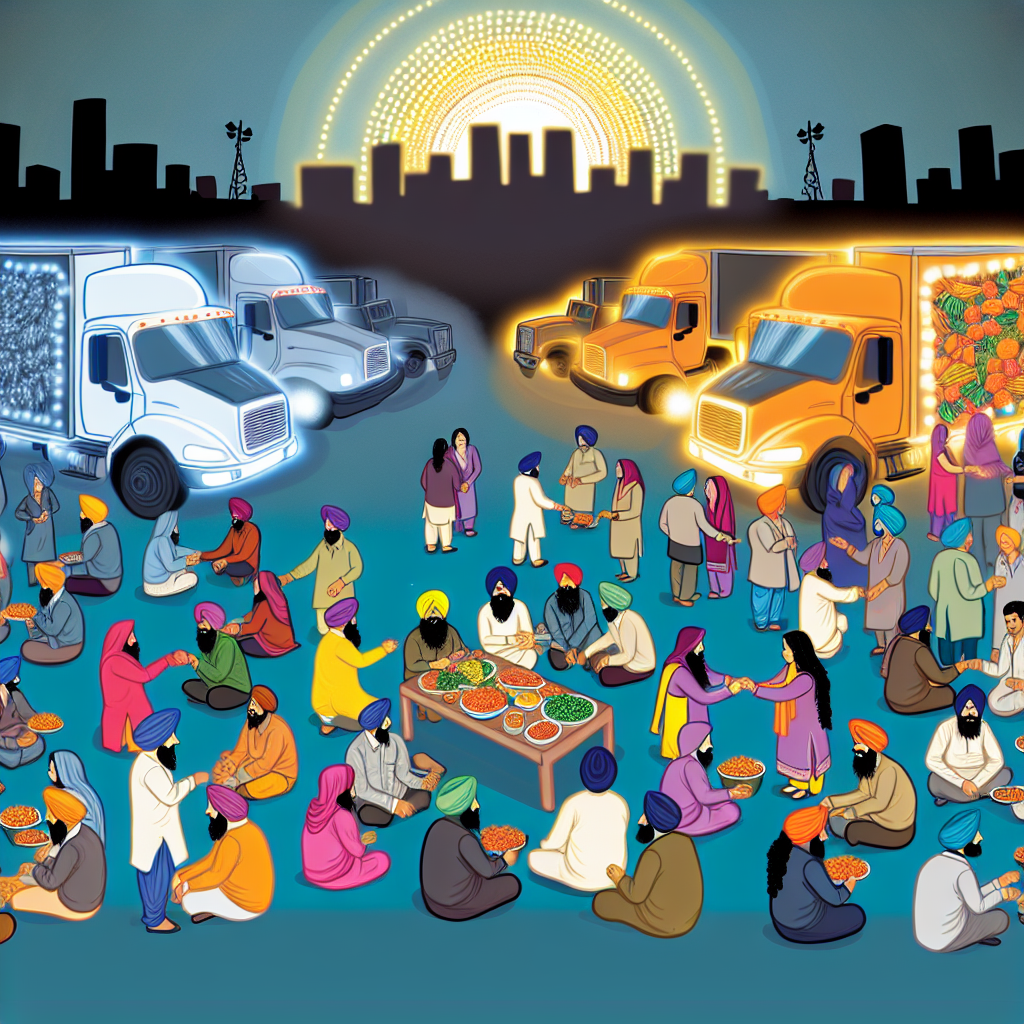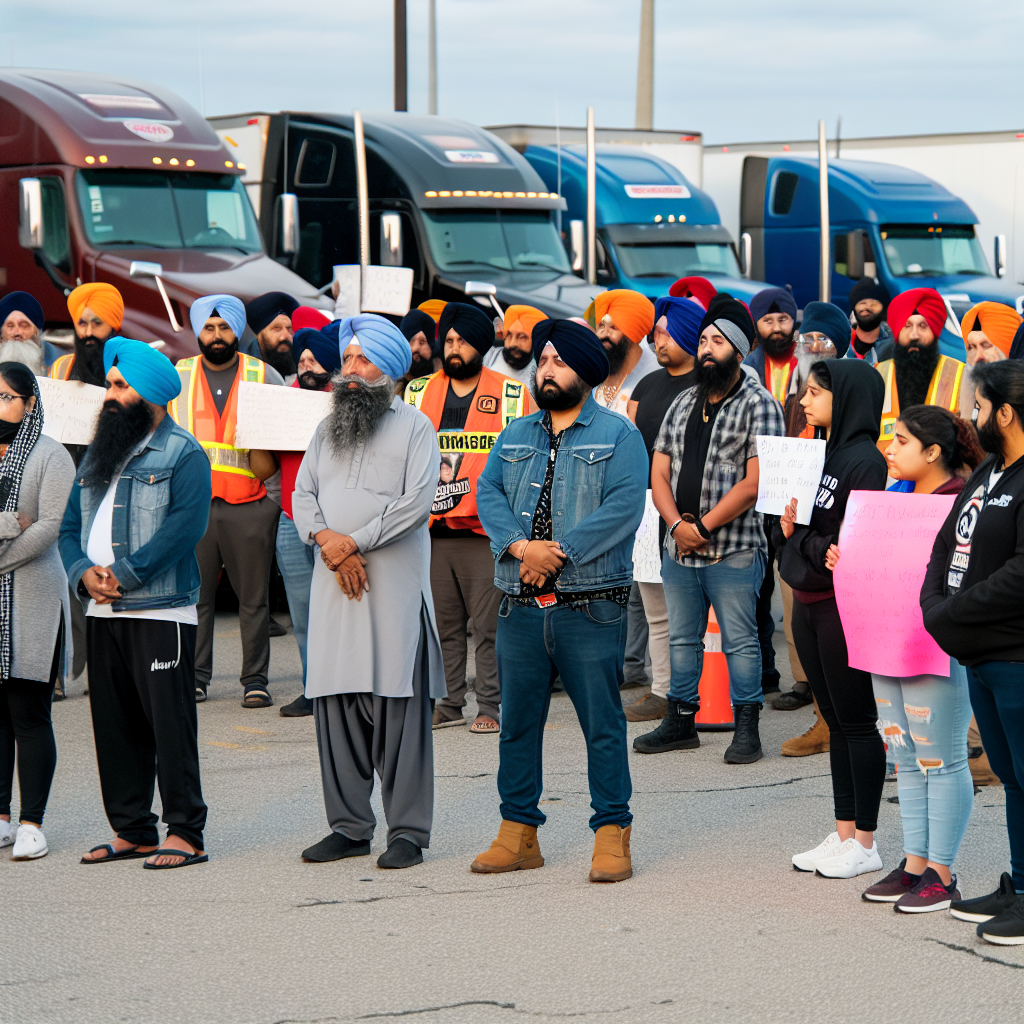In the wake of a tragic Florida crash involving Sikh truckers, sorrow and outrage ripple through the community and beyond. This devastating incident not only claimed lives but also exposed the deep-seated issues of discrimination and anti-Sikh rhetoric that continue to plague the Sikh community in America. Trucking is more than just a means of livelihood for many Sikh Americans; it represents a significant cultural heritage that intertwines with their identity and values.
The loss suffered has ignited conversations surrounding the vulnerability of this community, often seen as easy targets for prejudice and scapegoating in times of crisis. As we reflect on this heart-wrenching event, we are reminded of the greater implications it has on the Sikh community, revealing not only the need for solidarity but also the vital importance of understanding the cultural significance of trucking within their communities.
In these moments of grief, it becomes crucial to stand together against hate, ensuring that such tragedies do not go unnoticed or unchallenged. The time has come to address these issues head-on, for the future of the Sikh trucking community and their rightful place in the fabric of American society hinges on our collective response to this tragedy.
The Sikh trucking community has responded with strong concern and unity following the tragic crash involving Sikh trucker Harjinder Singh. The incident sparked fears of discrimination and violence within the community.
Community leaders have voiced worries about the growing anti-Sikh sentiment that surfaced after the crash. Prahb Singh, a truck driver from Riverside, California, shared his concerns about a rise in hostile online comments directed at Sikhs. He stressed that the crash should not define their community, stating, “This was an isolated event; it does not reflect who we are.” This captures the struggle against harmful stereotypes that often emerge after such tragedies.
Sikh truck drivers have become more anxious as they reassess their safety in the workplace. Harsimran Singh, CEO of Gillson Trucking, noted a significant wave of resignations: “Five of my Sikh drivers quit due to safety concerns. They no longer feel safe on the roads.” This highlights the serious anxiety Sikh truckers face daily and raises important concerns about their long-term safety and job stability.
In a powerful expression of community solidarity, Sikh organizations have mobilized support initiatives. UNITED SIKHS held a rally in Florida at the jail where Harjinder Singh was detained. During the rally, they offered prayers and highlighted the issue of anti-Sikh discrimination. Gurvinder Singh, the organization’s international humanitarian aid director, emphasized their commitment to seeking justice for all Sikhs, declaring, “We stand together to show our commitment to justice and equal opportunity for all Sikhs.” This conveys a strong determination to combat prejudice and promote fairness.
Additionally, the organization Sikhs for Justice announced a $100,000 compassion aid fund to assist the families of victims from the crash. This initiative underscores the community’s values of compassion and brotherhood and provides financial support to those facing hardship during difficult times.
Overall, the Sikh trucking community’s responses reveal a dual narrative of fear and resilience as they respond to the aftermath of this tragic incident with a focus on support and unity.
Expanded Community Responses to the Florida Crash
The Sikh trucking community’s response to the tragic crash involving Harjinder Singh was characterized by deep concern, resilience, and mobilization. After the incident, community leaders nationwide began discussing fears of heightened discrimination, echoing a wider anxiety experienced by many Sikhs.
Prahb Singh, a seasoned truck driver from Riverside, California, highlighted unexpected repercussions. He remarked, “This is not just about one person; it’s about a community that has been living under a cloud of suspicion since the events of September 11.” His comments underline the ongoing struggles Sikhs face regarding safety on the road and in their daily lives amid a challenging societal landscape. Social media platforms have seen an increase in hostile comments, indicating that these incidents are part of a larger troubling trend.
Local Sikh temples and organizations, including UNITED SIKHS, have intensified their outreach efforts to foster unity among Sikhs and non-Sikhs alike. Initiatives such as community prayer meetings and educational workshops focused on raising awareness about Sikh customs and challenges have been organized. These activities not only provide comfort to grieving families but also address negative narratives that can lead to further discrimination.
Key cities have seen protests where diverse communities joined Sikhs to demand justice, condemning the xenophobic rhetoric that has surged after the crash. Sikh truckers, like Harsimran Singh, engage not only in efforts to combat workplace discrimination but also in promoting awareness and understanding across broader societal channels. He stated, “We need our allies to speak out, to combat unfair treatment directed at all truck drivers, regardless of their background.”
These community responses demonstrate a strong commitment to fighting discrimination while showcasing the deep relationships existing within and across communities. Despite the heavy fears, the Sikh trucking community has exhibited remarkable unity and determination in advocating for positive change amid adversity.

Sikh truckers in the United States face numerous legal challenges that reflect broader issues of discrimination and tension within the community. A significant case involved J.B. Hunt Transport Services Inc., which settled for $260,000 in 2016 with four Sikh truck drivers who claimed religious discrimination. These drivers were denied employment when they refused to cut their hair for pre-employment drug tests, a requirement that conflicted with their religious observance of maintaining unshorn hair. Additionally, one driver faced pressure to remove his turban while providing a urine sample, directly infringing on his religious practices. The U.S. Equal Employment Opportunity Commission (EEOC) found J.B. Hunt insufficient in accommodating the drivers’ beliefs, thereby violating Title VII of the Civil Rights Act. In response to the settlement, J.B. Hunt amended its anti-discrimination policies and pledged to educate its hiring staff on how to accommodate religious practices. This case signifies a troubling trend among Sikh truckers in the industry, who often confront employment policies that clash with their religious beliefs, such as mandatory hair sample drug testing.
Beyond individual cases, the Sikh Coalition, recognized for its civil rights advocacy, emphasizes the importance of accommodating Sikh religious practices in the workplace. Legal challenges faced by Sikh truckers not only spotlight the discrimination they encounter but also amplify feelings of exclusion and marginalization within their community. These issues often arise during heightened tensions surrounding accidents or public incidents, which disproportionately spotlight Sikhs as targets for prejudice.
The cumulative effect of these legal struggles contributes to a narrative of tension and discrimination that permeates the Sikh trucking community. They reflect a persistent gap in understanding and accommodating religious diversity, prompting discussions about the efforts needed for greater inclusivity in the workforce. Resolution of these challenges is crucial not only for the rights of the individuals involved but also for fostering a more equitable environment for Sikh truckers and the broader community. As legal sentiments evolve, they represent progress toward a workplace that respects religious diversity and upholds the rights of all employees.
In summary, the legal battles of Sikh truckers signify more than personal grievances; they are indicative of a larger struggle against systemic discrimination and the need for better policies that honor religious practices within American workplaces.
This context contributes significantly to the narrative surrounding Sikh truckers and their experiences of discrimination, revealing broader implications for their representation and treatment in society.
Evidence of Increasing Anti-Sikh Rhetoric and Discrimination
Since the tragic Florida crash involving Sikh trucker Harjinder Singh on August 12, 2025, there has been a marked rise in anti-Sikh sentiment and discrimination within the trucking industry. Statistics from the North American Punjabi Truckers Association (NAPTA) indicate that Sikh drivers, who represent approximately 20% of truckers nationwide and nearly 40% on the West Coast, are increasingly facing harassment and hostility. Reports of verbal abuse have surged, with incidents like a Sikh driver being forcibly removed from a truck stop in Oklahoma while trying to access the shower facilities (AP News). Such confrontations starkly illustrate the escalating tensions within the industry.
Community leaders and advocacy groups have voiced growing concerns about the scapegoating of Sikh truckers following the accident. The Sikh Coalition, the largest Sikh advocacy group in the United States, emphasizes that Sikhs remain among the most targeted groups for hate crimes (The Journal). They argue that attributing the actions of a single individual to an entire community can lead to rising violence and discrimination. This situation has been especially alarming, as it reignites fears related to racial profiling and hate crimes that had been simmering since the post-9/11 era.
Anecdotal accounts from Sikh truckers reveal the personal impact of this rising hostility. Prahb Singh, a truck driver from Riverside, California, reported an alarming increase in derogatory online comments aimed at Sikhs (Punjab News Express). He described being subjected to harsh statements like, “Take the towel heads off the streets,” underscoring the depth of vitriol directed towards the community, even before legal proceedings had begun regarding the accident. Sukhpreet Waraich, who owns a trucking company in California, shared similar concerns, revealing that many Sikhs feel increasingly scrutinized and judged because of their appearance and heritage (WOKV).
The repercussions of these discriminatory attitudes can be severe, not only affecting individual truckers but also impacting the broader Sikh community’s wellbeing. Harsimran Singh, CEO of Gillson Trucking, laid bare the fears expressed by many in his workforce; he reported that five Sikh drivers resigned amid safety concerns surrounding the backlash following the crash (AP News). This reaction signals a systemic issue affecting job security and safety for Sikh truckers, emphasizing the urgent need for solidarity and support within and outside the community.
In summary, the increase in anti-Sikh rhetoric and discrimination in the trucking industry following the Florida crash has prompted immediate concerns and reactions from within the Sikh community. As advocacy groups enhance their efforts to educate Sikh truckers about their rights and the support systems available to them, the collective response aims to counter the burgeoning discrimination and reaffirm the Sikh community’s place within the broader American landscape. Through communal resilience and awareness, the Sikh trucking community is striving to navigate these challenges despite the heavy toll this situation has precipitated.
Rising Anti-Sikh Rhetoric in the Trucking Industry
In the aftermath of the tragic crash involving Sikh truck driver Harjinder Singh on August 12, 2025, there has been an alarming increase in anti-Sikh sentiment within the trucking community. This incident, which resulted in multiple fatalities and serious charges against Singh, has heightened scrutiny and hostility towards Sikh drivers, who are a substantial part of the workforce in this sector.
Specific Instances and Quotes
Reports indicate that Sikh truckers are increasingly facing harassment and discrimination. One particularly disturbing incident involved a Sikh driver being forcibly ejected from a truck stop in Oklahoma simply for attempting to use the shower facilities. The North American Punjabi Truckers Association (NAPTA) has documented numerous instances of verbal abuse directed towards Sikh drivers (Punjab News Express).
Prahb Singh, a truck driver from Riverside, California, highlighted the rise in negativity saying, “There are a lot of negative comments online, and it is troubling to see such hostility directed at us.” Another Sikh truck driver lamented, “It’s hard enough to do this job without feeling like I have a target on my back every time I step out of my truck.” These sentiments underscore an increasing perception of vulnerability among Sikh truckers.
In the wake of the crash, online platforms have become hotbeds for derogatory remarks aimed at Sikhs. Comments such as “Take the towel heads off the streets” have emerged, exacerbating fears within the community, as observed by truckers like Sukhpreet Waraich, who described feeling scrutinized and judged due to their appearance and heritage.
Advocacy and Community Response
In response to this troubling trend, community leaders and advocacy groups, including the Sikh Coalition, have condemned the scapegoating of Sikhs and emphasized the need for fair legal proceedings. Harman Singh, the executive director of the Sikh Coalition, cautioned against using the actions of one individual to demonize an entire community, stating, “We must not let this tragedy fuel our prejudices and stereotypes against Sikhs.”
Reports also indicate that due to heightened fears of hostility, five Sikh drivers resigned from a California-based trucking company, according to Harsimran Singh, CEO of Gillson Trucking (AP News), indicating significant ramifications for workforce stability and safety within the community.
Conclusion
The increase in anti-Sikh rhetoric following the live events surrounding the Florida crash signifies broader societal issues that extend beyond the trucking industry. It’s imperative for individuals and organizations alike to foster dialogue and ensure that such incidents do not lead to widespread discrimination against the Sikh community. Advocacy and education play vital roles in countering this wave of hostility and promoting an inclusive and equitable environment for all truckers.
This tragic incident serves as a stark reminder that community solidarity and awareness are key in combating prejudice and ensuring safety within the trucking profession.
| Metric | Sikh Truckers | General Trucking Community |
|---|---|---|
| Perceived Safety Level | Low | Moderate |
| Reported Incidents | High | Medium |
| Community Support Levels | Strong |
Conclusion
The tragic crash involving Sikh truckers has starkly illustrated the vulnerabilities faced by this community and the often unacknowledged discrimination that follows such incidents. As we reflect on the repercussions of this event, it is crucial to emphasize the collective impact it has not only on individual Sikhs but on the entire community’s ability to pursue their livelihoods in safety and dignity. The rise in anti-Sikh rhetoric and the palpable fears among drivers underscore an urgent need for greater awareness and solidarity within society.
In the wake of adversity, the Sikh community has shown remarkable resilience, mobilizing for support and standing against the tide of discrimination. However, these efforts must be met with a call to action for all individuals and organizations. It is imperative that we encourage initiatives aimed at fostering a more inclusive trucking environment that recognizes the cultural significance of Sikh truckers.
By supporting advocacy groups and local organizations, we can collectively work to dispel hateful sentiments and create safer spaces for all truckers. Together, we can help ensure that incidents like this are not just moments of sorrow but catalysts for change and unity. Let us stand in solidarity with the Sikh community, affirming their rightful place in the diverse fabric of American society and advocating for a trucking industry that is inclusive and respectful of all backgrounds.


A visual representation of community solidarity within the Sikh trucking network, symbolizing support, resilience, and hope, capturing the essence of unity among Sikh truckers.
SEO Optimization: Enhancing Visibility for the Sikh Trucking Community
In the aftermath of the tragic Florida crash involving Sikh truckers, it is crucial to shed light on the issues facing the Sikh trucking community. The stark realities of discrimination in trucking are magnified in this context, highlighting the need for increased awareness and support. Trucking safety for Sikh drivers has become an urgent topic of discussion, as many within this community express concerns about their safety and well-being following the incident.
The Sikh trucking community represents a vital segment of the trucking industry, contributing to its diversity and resilience. However, the challenges they face, including discrimination and rising anti-Sikh rhetoric, cannot be ignored. To effectively combat these issues, we must foster a culture of inclusivity, ensure trucking safety for Sikh drivers, and stand united against discrimination in trucking.
By addressing these critical areas, we can work towards a more equitable environment for all truckers, reinforcing the Sikh community’s rightful place in the fabric of society. Continued dialogue and action are necessary to build solidarity and ensure that the experiences of Sikh truckers are recognized and validated across the industry.


